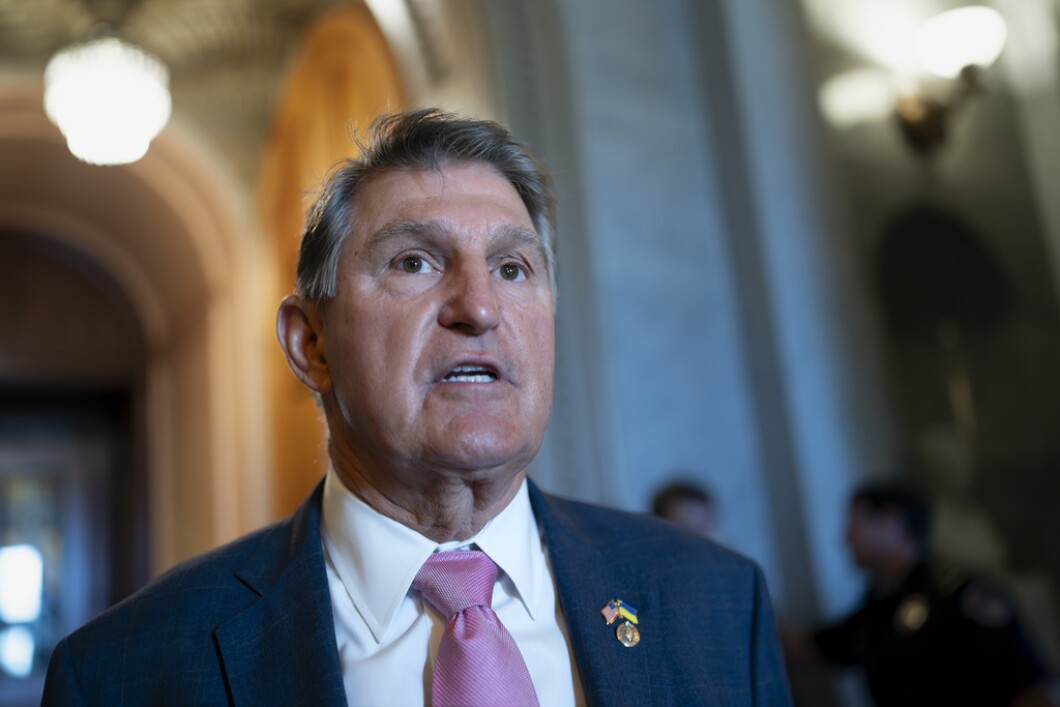
Sen. Joe Manchin (D-WV), chairman of the Senate Energy Committee and one of the most powerful political players in Washington, announced Thursday he wouldn’t be running for reelection, upheaving the Washington energy landscape and calling into question the next steps for priorities such as permitting reform.
In a surprise video announcement, the chairman stated he would not seek reelection in the Senate, dispelling questions about whether the West Virginian would defend his seat.
REPUBLICAN DEBATE: THE FOUR BIGGEST TAKEAWAYS FROM NBC’S MIAMI MATCHUP
Manchin would be forgoing a difficult race against his home state’s governor, Jim Justice, a popular Republican leading Manchin in the polls.
“I’ve made one of the toughest decisions of my life and decided that I will not be running for reelection to the United States Senate,” he said. In the video, the senator left ambiguity regarding his next steps, stating that he would be traveling the country “and speaking out to see if there’s interest in creating a movement to mobilize the middle.”
Questions remain on whether or not he’s entertaining a third-party run for president, an endeavor he has repeatedly declined to rule out, possibly on a ticket supported by the heavily funded group No Labels.
Following Manchin’s announcement, many questions are circling around Washington about what this might mean for energy policy priorities that face an already uphill climb in a divided government. Furthermore, many are wondering who can fill the West Virginia Democrat’s large shoes on the Senate Energy Committee, a chair that gave Democrats a huge win this past Congress with the largest climate bill ever passed but might have led to Manchin’s fall in a deeply red, coal-focused state.
An energy magnate
Elected to the West Virginia House of Delegates at 35, Manchin’s political career became deeply interwoven with the energy industries that occupied his home state, all the way through his governorship and his time in the Senate. Dating back to 1987, the West Virginia Democrat went into business with the Grant Town power plant, which became the sole customer of his waste coal brokerage company for more than 20 years, according to a report from the New York Times. And over the years, Manchin used his political influence to benefit the plant, along with his family business.
According to the report, he urged a state official to approve an air pollution permit and tried to convince fellow lawmakers to support a tax credit that would stand to benefit the plant. During his governorship, he supported a provision that classified coal waste as a form of alternative energy in a bill that was later signed into law in 2009.
Manchin managed Enersystems, Inc., until passing on control of the company’s daily operations to his son, Joe Manchin IV, in 2000 after Manchin was elected to become West Virginia’s secretary of state. Still, from 2010 to 2020, the lawmaker reported $5.6 million in earnings from the company.
Coming into the Senate in 2010, Manchin made his conservative lean on energy and environment issues clear before he even stepped foot in the upper chamber, campaigning in a famous television ad in which he shot a copy of a cap and trade bill. In the ad, Manchin also touted that he previously sued the Environmental Protection Agency over its proposed rules imposing stricter pollution restrictions when issuing Clean Water Act permits for coal mines.

Following his reelection campaign in 2012, Manchin continued to highlight his centrist chops, advocating fossil fuels in the face of his party’s efforts to transition to a greener economy. Manchin was publicly critical of the Obama administration’s energy policies, showcasing his frustration when the EPA canceled a massive mountaintop-removal coal mine in West Virginia that was greenlighted by the previous White House. In response, the West Virginia Democrat introduced a bill that would prevent the agency from revoking permits that were already finalized.
The centrist continued to distinguish himself within the Democratic Party. In 2013, the West Virginia lawmaker opposed the then-president’s pick to lead the Federal Energy Regulatory Commission, arguing that the nominee, Ron Binz, “prioritizes renewables over reliability.” The nomination eventually collapsed, with Binz stepping aside after it was clear his vote wouldn’t pass the Senate Energy and Natural Resources Committee.
Fast forward to the last couple of years, and Manchin has continued to use his middle-of-the-road politics in negotiations for consequential pieces of legislation. During negotiations for President Joe Biden’s sweeping Build Back Better plan, Manchin was one of the key figures to watch after expressing skepticism about the price tag for the multitrillion-dollar reconciliation bill, along with the clean energy provisions in the climate portions of the legislation.
Manchin was able to kill a key provision supported by environmentalists that would have imposed a clean electricity standard on utilities and penalized them for burning coal and natural gas. Still, in December 2021, Manchin announced his opposition to a House-passed reconciliation bill. “I can’t vote for it,” Manchin said. “I just can’t. I’ve tried everything humanly possible. I can’t get there.”
It wasn’t until July 2022 that Manchin and Senate Majority Leader Chuck Schumer (D-NY) announced they had a deal on a slimmed-down, reworked version dubbed the Inflation Reduction Act. The measure later passed on a 51-50 vote and passed into law in August.
However, his “yes” vote would catalyze a barrage of Republican campaigns attacking him, with conservative groups running ads spotlighting Manchin supporting what they called “D.C. liberal climate policy.”
What this means for permitting reform
Following the news of the announcement, several lawmakers noted that the loss of Manchin in the Senate would mean the loss of a bipartisan power player and would up the pressure to get something done on permitting reform before the end of the Congress.
Sen. Dan Sullivan (R-AK) cited the West Virginian’s advocacy for oil and gas leasing in his home state’s National Petroleum Reserve.
“Manchin, particularly on Alaskan energy issues, on permitting, has been really strong,” Sullivan said. “Look, we got another year left. Hopefully we can get some of his priorities — which are usually my priorities, particularly permitting reform — done.”
Sen. Debbie Stabenow (D-MI), the top Democrat on the Senate Agriculture Committee who’s also retiring at the end of the term, asserted that Manchin’s announcement doesn’t mean the end of momentum for his policy goals.
“One of the things that I have learned, as somebody who has announced that ‘I’m not running again,’ it does not diminish my capacity to get things done,” Stabenow told the Washington Examiner. “I think he’ll continue, certainly, to be engaged in the things he cares about.”
Still, even those outside the Hill could recognize the big shoes the next Energy Committee chairman will have to fill.
“It is a big loss because he was a real leader on the issue and very knowledgeable,” Frank Maisano, a senior principal at government relationship firm Bracewell LLP who worked with Manchin to build wind projects in West Virginia, said in a written statement. “He was also one who could bring both sides together and both renewables and fossil fuels.”
Maisano noted that Manchin’s announcement could ignite a final push from the West Virginia Democrat, along with others, to get permitting reform across the finish line before the next Congress begins in 2025. However, it’s still a tall hill to climb, as election-year politics could slow movement on any substantial piece of legislation.
CLICK HERE TO READ MORE FROM THE WASHINGTON EXAMINER
And not everyone is sad to see Manchin go — namely, environmental advocates who have been critical of his support for fossil fuels and his opposition to more liberal green policies.
Several questions remain surrounding which Democrat will step up to lead their members on the Energy Committee. Some of the most senior lawmakers, such as Sens. Ron Wyden (D-OR), Maria Cantwell (D-WA), and Sen. Bernie Sanders (I-VT), are chairs of other committees and would have to forgo their plum seats to either be chair or ranking member, depending on which party controls the Senate in 2025. Before Manchin took up the committee gavel, then-ranking member Cantwell jumped to chair the Commerce Committee, leaving the door open to Manchin to assume the position after other more senior members declined.
Emily Jacobs contributed to this article.





